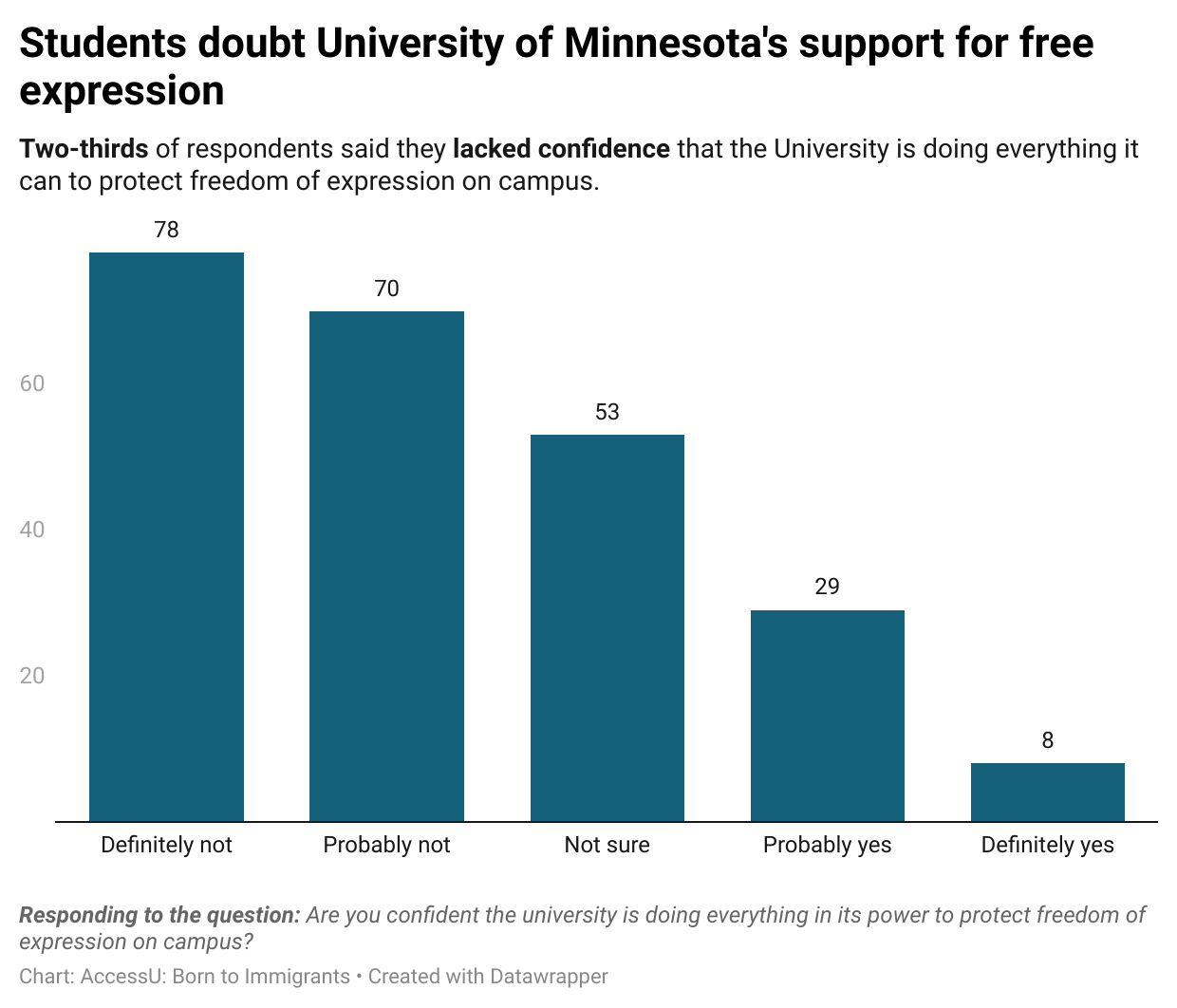The AccessU: Born to Immigrants survey found undergraduates feel a sense of belonging at the university from peers and are making or taking action since the White House announced its immigration plans.
Byline: By Hannah Ward (Data Editor) and Molly Stroh (Data/Survey Editor)
University of Minnesota students are highly concerned about freedom of expression on campus and the impact of recent White House immigration actions, according to a recent AccessU: Born to Immigrants survey.
Another key finding published last week shows respondents do not feel confident the university will do everything in its power to protect students from Immigration and Customs Enforcement (ICE).
The survey revealed additional insights, including:
- A majority of respondents said they are not confident the university is doing everything in its power to protect freedom of expression on campus, and half said they do not believe students can confidently and safely exercise the right to protest.
- Respondents said they were “highly concerned” about recent executive orders or administration policy changes related to immigration, including those related to birthright citizenship, the ability of federal immigration agents to enter schools and churches, the disbanding of DEI programs and the denaturalization of U.S. citizens.
- Most respondents who said they or their families have been affected by recent executive immigration actions indicated they were not only experiencing stress but also making plans and taking action as a result.
- Most respondents said they feel a sense of belonging at the university, although this percentage was slightly lower for students born to immigrants. For those students, belonging came from connection with peers and people who share their identity but not from university resources.
- Many respondents feel a sense of security because of meaningful relationships with peers and access to housing, but less so because they trust university administration and police.
Methodology and demographics
The survey, conducted in March, asked questions about the university’s resources and support of students with immigrant parents and students’ views on protection of free expression and changes in immigration policy. A focus of the survey was on the university’s responses to those changes. The survey was sent via email to a random sample of 5,000 undergraduate students at the university.
Almost half of the survey’s 268 respondents said they had a parent born outside of the U.S. Among those, most of their parents had come from Asia followed by Africa and then Central and South America. A smaller number of student respondents were themselves born in other countries, and in those cases, Africa accounted for a higher proportion than those born in the U.S.
Around 62% of survey respondents said they were affiliated with the Democratic Party — a proportion lower than the roughly three-quarters of voters in precincts around campus who voted for Kamala Harris in 2024. Republicans, Independents and “other” each accounted for 5% each among respondents, with 17% saying they do not affiliate with any political party.
Due to the sample size and self-selecting survey collection method, these findings cannot be extrapolated to the entire student population. Rather, the survey should be considered a large questionnaire that provides insights. Students with immigrant parents were also able to leave comments and their contact information for follow-up interviews.
Lack of confidence in free expression protection and ability to protest
A majority of respondents — 62% — said they do not think the university is doing everything in its power to protect freedom of expression on campus. By contrast, 15% said the university would do all it could while almost one-quarter said they were unsure.
In another response, half of the students said they did not feel they could confidently and safely exercise the right to protest. One quarter cited actions by the Trump administration against protestors as the reason they do not feel confident in students’ ability to protest.
When asked what caused their lack of confidence, respondents overwhelmingly attributed it to the university’s response to protests on campus.
The university arrested more than 20 campus protesters in the past year, nearly all of whom were involved in pro-Palestine demonstrations.
University of Minnesota Police Department (UMPD) arrested nine protesters at a pro-Palestine encampment last April, sparking additional encampments the following week.
The Board of Regents consolidated guidelines for protesting in August 2024, including limiting gatherings to fewer than 100 people and restricting signs to be smaller than 14 inches by 22 inches.
Pro-Palestine protestors also briefly occupied the administrative building that houses the office of University President Rebecca Cunningham in October last year. UMPD arrested protesters and detained one reporter from the Minnesota Daily. Last month, university police arrested a protester for trespassing at a Board of Regents meeting.
Protests around campus have increased within the past two weeks as the Trump administration’s immigration policies have targeted campuses around the country, including in Minnesota.
Secretary of State Marco Rubio said last week 300 student visas have been revoked, and that the federal government has the right to rescind visas of students who participate in campus protests.
ICE officers have arrested students from Columbia University, Tufts University and the University of Alabama and more in recent weeks. One University of Minnesota student is in ICE custody and five Minnesota State University, Mankato students have had their visas revoked.
Survey respondents voiced strong concerns about federal immigration actions in their comments.
“I feel horrible for all of the people getting caught by ICE and are getting essentially ‘kidnapped’ at this point,” one respondent wrote.
Students highly concerned about executive orders
Four out of every five respondents said they were “highly concerned” about the Trump administration’s recent immigration-related executive orders and policy changes.
Across the board, students said they were highly concerned about the order to ban birthright citizenship, the ICE policy change expanding the areas where they can make arrests, the order to disband DEI programs and the order to denaturalize U.S. citizens for various offenses.
Students also voiced significant concern in response to a question about the White House’s recent decision to override a federal judge’s order which mandated the return of two planeloads of Venezuelan deportees to the U.S.
Sixty percent of respondents said the decision signaled a “constitutional crisis,” while an additional 24% expressed concern because of the critical role courts play as a check in our system.
Effect of executive orders creates stress, prompts action
Nearly a quarter of respondents born to immigrants said that executive orders on immigration policy have affected them or their family.
The impact of these executive orders on immigration is not just student stress, but also planning or taking action. Over half who said they have been impacted reported thoughts of taking action, and 18% said they have taken concrete action steps related to these orders.
“I not only have family that is going to be affected by his orders, but friends and their families who I am extremely concerned about,” one respondent wrote.
Students still find belonging, security, resources on campus
Despite concerns, students said they have been able to find belonging and security on campus through connections with peers and people who share their identity — but less so from university resources.
“I am thankful for student organizations such as Sigma Lambda Gamma, Mi Gente, MALCS, and many more for Latinx students. These are crucial for Latinx students to have a sense of belonging,” one student wrote.
Roughly two-thirds of respondents indicated they felt secure at the University because they feel supported by people they know and have access to food and housing. For the more than 50 students who said they do not feel secure, the most frequent explanation was a distrust of university administration and police, followed by financial insecurity.
Two-thirds of students who searched for resources on campus to support their cultural identity found it relatively easy.
The 14% of respondents who do not share a feeling of belonging cited challenges connecting with peers, but said the main reason was that university resources did not feel welcoming.
One respondent described having “one-sided conversations with faculty” that aim, but fail, to focus on students with ties to immigrant experience.
“It feels impossible to make a connection with people here,” another respondent wrote.
And another respondent wrote, “I feel like we aren’t heard enough.”

